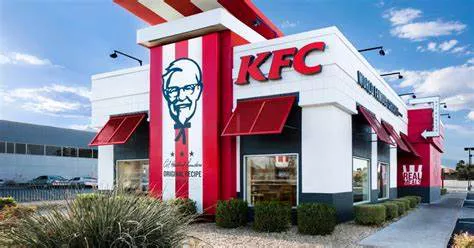Kentucky Fried Chicken, better known as KFC, is one of the most recognizable fast food brands worldwide, famous for its “finger-lickin’ good” fried chicken. Since its inception by Colonel Harland Sanders in 1952, KFC has grown exponentially, both domestically and internationally. As of today, it operates over 23,000 outlets in more than 140 countries, serving millions of customers daily. A significant portion of its global presence is attributed to its franchise model, which has been a substantial success, drawing entrepreneurs eager to tap into a proven system with a globally loved brand.
For potential franchisees, understanding the financial performance, specifically how much money a KFC franchise makes, is crucial. This analysis will explore various financial aspects of owning a KFC franchise, including initial investments, ongoing fees, average sales, and profitability.
Understanding KFC Franchise Investment
The journey to owning a KFC franchise starts with understanding the investment required. This includes both the initial capital investment and ongoing operational costs. According to KFC, the initial costs can range from approximately $1.3 million to $2.5 million. This range is broad due to factors such as location, building size, and regional economic conditions.
Here’s a breakdown of these costs:
Franchise Fee: The initial franchise fee to open a KFC restaurant is $45,000. This fee grants the franchisee the license to use KFC’s trademarks, service marks, and other proprietary information.
Real Estate and Construction Costs: These costs vary significantly based on location and whether the building is purchased or leased.
Construction costs also fluctuate based on local material and labor costs.
Equipment and Supplies: Equipping a restaurant with all the necessary tools, from kitchen equipment to furniture and signage, also represents a considerable part of the investment.
Training and Support Costs: KFC provides extensive training for franchisees, which is included in the initial investment.
However, travel and lodging costs for attending these sessions are additional.
Opening Inventory: This includes all initial food, beverage, and paper supplies needed to start operations.
Working Capital: Sufficient working capital is necessary to cover the restaurant’s operational expenses such as employee salaries, utilities, and marketing until the business becomes self-sustaining.
See Also: Kentucky Fried Chicken (KFC) Franchise
Ongoing Costs And Fees
Beyond the initial investment, franchisees must budget for ongoing operational costs:
Royalty Fees: KFC charges a royalty fee of 5% of gross sales. This fee is for ongoing use of the brand and operating system.
Advertising Fees: Franchisees are also required to contribute approximately 4.5% of their gross sales to national and local advertising efforts.
Renovation Costs: Periodically, franchisees might be required to update their facilities and equipment to adhere to the franchisor’s current branding and operational standards.
see also: Cousins Subs Franchise
Revenue Potential of A KFC Franchise
The average annual sales for a KFC franchise vary greatly depending on numerous factors such as location, store size, local market economics, and management efficiency. According to data from various industry reports and franchise disclosure documents, the average KFC outlet in the United States reports gross sales of around $1 million to $1.2 million annually.
However, it’s essential to understand that gross sales do not equate to profitability. Profit margins can be affected by operating costs like labor, rent, utilities, and the ongoing fees mentioned previously.
Generally, the net profit margin for a well-run KFC franchise can range from 10% to 15% of gross sales, depending on the efficiency of operations and overhead costs.
Factors Influencing Financial Performance
Several factors influence the financial performance of a KFC franchise. These include:
Location: A prime location with high foot traffic, good visibility, and easy accessibility can significantly drive sales higher.
Local Market Conditions: Economic conditions, local competition, and regional preferences can affect sales.
Management: Efficient management practices are crucial in controlling costs and maximizing revenue. This includes effective inventory management, labor scheduling, and customer service.
Marketing and Promotions: Local store marketing and promotions tailored to the community can boost sales during off-peak times and attract new customers.
Return on Investment (ROI)
The return on investment for a KFC franchise varies based on the initial investment, ongoing expenses, and actual sales figures. However, with gross sales averaging around $1 million and assuming a net profit margin of around 12%, a franchisee could expect annual net earnings of approximately $120,000 to $180,000. Considering the higher end of the initial investment range, the ROI period could be significant, often requiring several years to recoup the initialoutlay.
Advantages of Owning A KFC Franchise
Brand Recognition: Operating under the KFC banner offers immense brand recognition, which can translate into immediate customer trust and business.
Comprehensive Training and Support: KFC provides extensive training and ongoing support, which is invaluable, especially for first-time restaurant owners.
Marketing and Advertising: Franchisees benefit from national and local marketing campaigns, which can significantly enhance business visibility and customer reach.
Innovation: KFC is known for its innovation in menu offerings, keeping the brand relevant and appealing to a broad customer base.
Conclusion
Owning a KFC franchise can be a lucrative business venture. However, like any business, it comes with risks and uncertainties. The financial performance of a KFC franchise largely depends on factors such as location, operational efficiency, and the ability to manage costs effectively. Potential franchisees should conduct thorough due diligence, understand all associated costs, and develop a comprehensive business plan before committing to opening a KFC franchise.
With proper management and a strategic approach, a KFC franchise can provide a strong return on investment and be a rewarding entrepreneurial endeavor.

